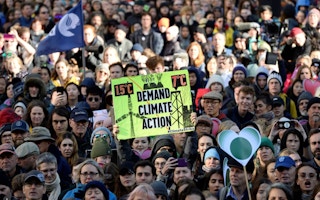A surprise decision by Chile, rocked by violent unrest, to withdraw as host of December’s UN climate conference risks throwing international efforts to ramp up action on global warming off course, environmentalists and rights activists fear.
They urged quick efforts to reorganise the negotiations, aimed at accelerating cuts in planet-warming emissions and helping vulnerable communities find ways to deal with the increasingly harmful impacts of climate change.
The announcement by Chile’s president on Wednesday came just over a month before the negotiations—known as COP25—were due to start and left the UN climate change secretariat scrabbling for an alternative venue.
On Thursday, the Spanish government said in a statement that acting Prime Minister Pedro Sanchez had indicated it was ready to do what was needed to host the summit in Madrid.
“
The same flawed economic policies that have sparked protests on the streets of Chile are fuelling the global climate crisis and the global inequality crisis.
Asier Hernando, deputy director of Oxfam, Latin America and the Caribbean
UN climate chief Patricia Espinosa said she had been informed by Chile about Spain’s offer to hold the conference as originally planned from Dec. 2-13, and was hopeful the proposed solution could be considered as soon as possible.
“It is encouraging to see countries working together in the spirit of multilateralism to address climate change, the biggest challenge facing this and future generations,” she added.
A day earlier, Climate Action Network International, which represents hundreds of environmental campaign groups, warned Chile’s move “must not detract from the political urgency to address the climate crisis” through emissions reductions and stronger efforts to adapt to wilder weather and rising seas.
Manuel Pulgar-Vidal, head of climate and energy work for conservation group WWF and president of the 2014 talks in Lima, called for a fast UN response in announcing updated plans for the conference.
“We encourage world leaders to continue to support the process and show it by stepping up their own country pledges, to ensure an extremely ambitious 2020,” he added.
Under the 2015 Paris Agreement, governments have committed to regularly strengthen targets in their national plans to lower planet-warming emissions, in order to meet global goals to curb rising temperatures.
They are due to submit their first revised plans by the end of 2020.
Ahead of that, the COP25 meeting is tasked with finishing work on the Paris pact rules, including those that will govern carbon markets.
The logistics and cost of hosting a COP are daunting, and Costa Rica - where a preparatory meeting for the Chile gathering took place recently - had said on Wednesday it could not take on the challenge.
Keep talking
Human rights and green groups also expressed concern about what the cancellation of the event in Chile might mean for ongoing protests there, which have resulted in close to 20 deaths, 7,000 arrests and business losses of about $1.4 billion.
They urged Chilean leaders to consider environmental issues as part of reforms to meet the demands of protesters, who want the government to address social inequalities.
Chilean President Sebastian Pinera said on Wednesday he had taken the “painful” decision to cancel COP25, as well as an Asia-Pacific economic summit next month, to focus on restoring law and order and pushing through a new social plan.
The United Nations has said it will send a team to investigate allegations of human rights abuses by Chile’s security forces during the unrest.
“The same flawed economic policies that have sparked protests on the streets of Chile are fuelling the global climate crisis and the global inequality crisis,” said Asier Hernando, deputy director of Oxfam in Latin America and the Caribbean.
“Urgent action is needed by governments to build economies that put people and the environment before economic growth and corporate profits,” he added.
Some climate change experts and diplomats said they understood the decision not to host the U.N. climate talks in Chile given security concerns and the need to focus on domestic problems.
Others, however, warned the decision should not shut down debate on environmental and social injustices in the troubled Latin American nation and beyond.
Cancelling or postponing such a meeting “doesn’t postpone climate change and its impacts,” said Jennifer Morgan, executive director of Greenpeace International.
“All over the world, people are clamouring for change. The channels for dialogue have to be kept open,” she added.
This story was published with permission from Thomson Reuters Foundation, the charitable arm of Thomson Reuters, that covers humanitarian news, climate change, women’s and LGBT+ rights, human trafficking and property rights. Visit http://news.trust.org/climate.










